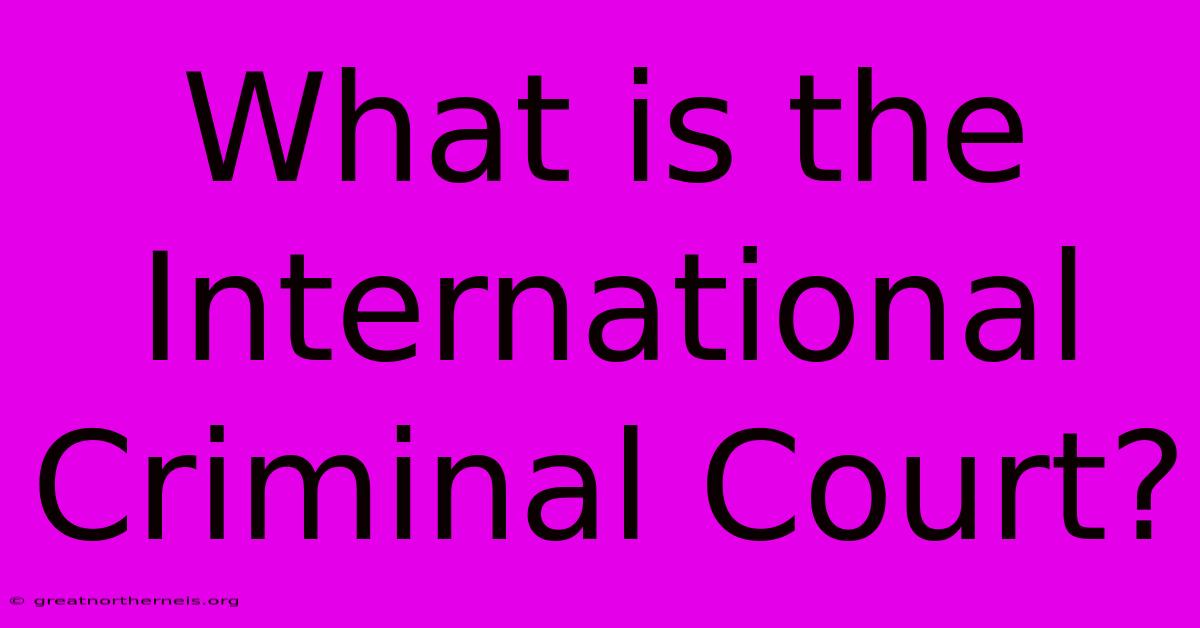What Is The International Criminal Court?

Discover more detailed and exciting information on our website. Click the link below to start your adventure: Visit Best Website mr.cleine.com. Don't miss out!
Table of Contents
What is the International Criminal Court?
The International Criminal Court (ICC) is a permanent tribunal established to prosecute individuals for the most serious crimes of international concern. It's a landmark institution in international law, representing a significant step towards accountability for perpetrators of atrocities. But what exactly does it do, and how does it function? This article will explore the ICC's mandate, jurisdiction, limitations, and ongoing relevance in the pursuit of global justice.
The ICC's Mandate: Prosecuting Atrocities
The ICC's primary mandate is to prosecute individuals, not states, for four core crimes:
- Genocide: Acts committed with intent to destroy, in whole or in part, a national, ethnical, racial, or religious group.
- Crimes Against Humanity: Widespread or systematic attacks directed against any civilian population. This includes murder, extermination, enslavement, deportation, imprisonment, torture, rape, persecution, and other inhumane acts.
- War Crimes: Grave breaches of the Geneva Conventions of 1949, and other serious violations of the laws and customs of war.
- The Crime of Aggression: This is the most recently added crime, defined as the planning, preparation, initiation or execution, by a person in a position effectively to exercise control over or to direct the political or military action of a State, of an act of aggression which, by its character, gravity and scale, constitutes a manifest violation of the Charter of the United Nations.
It's important to note that the ICC only prosecutes individuals, not states themselves. The court's jurisdiction is limited to crimes committed after the Rome Statute – the treaty establishing the court – came into force in 2002.
Jurisdiction and Limitations
The ICC's jurisdiction is determined by several factors:
- State Party Referral: A state party to the Rome Statute can refer a situation to the ICC Prosecutor.
- UN Security Council Referral: The UN Security Council can refer a situation to the ICC, even if the state in question isn't a party to the Rome Statute.
- Prosecutor's Own Initiative: The Prosecutor can initiate an investigation if they believe there is sufficient evidence of crimes within the Court's jurisdiction.
However, the ICC faces several limitations:
- Limited Membership: Not all countries are members of the Rome Statute, limiting the court's reach. Powerful nations like the United States and China are not members.
- Principle of Complementarity: The ICC only intervenes if national courts are unwilling or unable genuinely to investigate or prosecute.
- Political Influence: The ICC's independence can be challenged by political pressures from powerful states.
How the ICC Works
The ICC operates through a complex system of checks and balances:
- The Presidency: Oversees the Court's administration and judicial functions.
- The Prosecutor: Conducts investigations and prosecutes cases.
- The Registry: Provides administrative and logistical support.
- The Judges: Hear cases and deliver judgments.
Investigations are thorough and involve collecting evidence, interviewing witnesses, and conducting forensic analysis. Trials are conducted in accordance with international legal standards, ensuring fairness and due process. Sentences range from imprisonment to fines and other penalties.
The ICC's Impact and Ongoing Relevance
Despite its limitations, the ICC has significantly impacted the pursuit of international justice. It has brought perpetrators of horrific crimes to account, sending a powerful message that such atrocities will not go unpunished. Its existence serves as a deterrent, a symbol of hope for victims, and a testament to the growing international commitment to accountability.
The ICC's ongoing relevance is undeniable. As conflicts continue to erupt around the world, the court remains a crucial mechanism for holding individuals accountable for the most serious crimes. While challenges remain, the ICC's work is vital in promoting the rule of law and protecting vulnerable populations from atrocities. The ongoing evolution and strengthening of the Court are essential to ensure its effectiveness in achieving its vital mission.

Thank you for visiting our website wich cover about What Is The International Criminal Court?. We hope the information provided has been useful to you. Feel free to contact us if you have any questions or need further assistance. See you next time and dont miss to bookmark.
Featured Posts
-
Trumps Impact On Vulnerable Youth
Nov 23, 2024
-
119 118 Magics Victory Over Lakers
Nov 23, 2024
-
Ecotourism Market A Growth Forecast
Nov 23, 2024
-
Israel Hamas Targeted By Icc
Nov 23, 2024
-
Reddy And Cummins Border Gavaskar Talk
Nov 23, 2024
